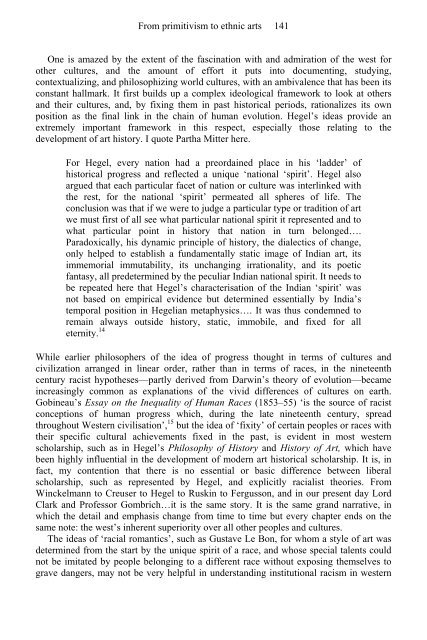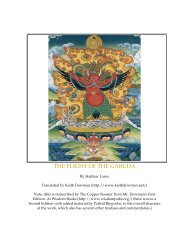Hiller - The Myth of Primitivism. Perspectives on Art - Esoteric Online
Hiller - The Myth of Primitivism. Perspectives on Art - Esoteric Online
Hiller - The Myth of Primitivism. Perspectives on Art - Esoteric Online
You also want an ePaper? Increase the reach of your titles
YUMPU automatically turns print PDFs into web optimized ePapers that Google loves.
From primitivism to ethnic arts 141<br />
One is amazed by the extent <str<strong>on</strong>g>of</str<strong>on</strong>g> the fascinati<strong>on</strong> with and admirati<strong>on</strong> <str<strong>on</strong>g>of</str<strong>on</strong>g> the west for<br />
other cultures, and the amount <str<strong>on</strong>g>of</str<strong>on</strong>g> effort it puts into documenting, studying,<br />
c<strong>on</strong>textualizing, and philosophizing world cultures, with an ambivalence that has been its<br />
c<strong>on</strong>stant hallmark. It first builds up a complex ideological framework to look at others<br />
and their cultures, and, by fixing them in past historical periods, rati<strong>on</strong>alizes its own<br />
positi<strong>on</strong> as the final link in the chain <str<strong>on</strong>g>of</str<strong>on</strong>g> human evoluti<strong>on</strong>. Hegel’s ideas provide an<br />
extremely important framework in this respect, especially those relating to the<br />
development <str<strong>on</strong>g>of</str<strong>on</strong>g> art history. I quote Partha Mitter here.<br />
For Hegel, every nati<strong>on</strong> had a preordained place in his ‘ladder’ <str<strong>on</strong>g>of</str<strong>on</strong>g><br />
historical progress and reflected a unique ‘nati<strong>on</strong>al ‘spirit’. Hegel also<br />
argued that each particular facet <str<strong>on</strong>g>of</str<strong>on</strong>g> nati<strong>on</strong> or culture was interlinked with<br />
the rest, for the nati<strong>on</strong>al ‘spirit’ permeated all spheres <str<strong>on</strong>g>of</str<strong>on</strong>g> life. <str<strong>on</strong>g>The</str<strong>on</strong>g><br />
c<strong>on</strong>clusi<strong>on</strong> was that if we were to judge a particular type or traditi<strong>on</strong> <str<strong>on</strong>g>of</str<strong>on</strong>g> art<br />
we must first <str<strong>on</strong>g>of</str<strong>on</strong>g> all see what particular nati<strong>on</strong>al spirit it represented and to<br />
what particular point in history that nati<strong>on</strong> in turn bel<strong>on</strong>ged….<br />
Paradoxically, his dynamic principle <str<strong>on</strong>g>of</str<strong>on</strong>g> history, the dialectics <str<strong>on</strong>g>of</str<strong>on</strong>g> change,<br />
<strong>on</strong>ly helped to establish a fundamentally static image <str<strong>on</strong>g>of</str<strong>on</strong>g> Indian art, its<br />
immemorial immutability, its unchanging irrati<strong>on</strong>ality, and its poetic<br />
fantasy, all predetermined by the peculiar Indian nati<strong>on</strong>al spirit. It needs to<br />
be repeated here that Hegel’s characterisati<strong>on</strong> <str<strong>on</strong>g>of</str<strong>on</strong>g> the Indian ‘spirit’ was<br />
not based <strong>on</strong> empirical evidence but determined essentially by India’s<br />
temporal positi<strong>on</strong> in Hegelian metaphysics…. It was thus c<strong>on</strong>demned to<br />
remain always outside history, static, immobile, and fixed for all<br />
eternity. 14<br />
While earlier philosophers <str<strong>on</strong>g>of</str<strong>on</strong>g> the idea <str<strong>on</strong>g>of</str<strong>on</strong>g> progress thought in terms <str<strong>on</strong>g>of</str<strong>on</strong>g> cultures and<br />
civilizati<strong>on</strong> arranged in linear order, rather than in terms <str<strong>on</strong>g>of</str<strong>on</strong>g> races, in the nineteenth<br />
century racist hypotheses—partly derived from Darwin’s theory <str<strong>on</strong>g>of</str<strong>on</strong>g> evoluti<strong>on</strong>—became<br />
increasingly comm<strong>on</strong> as explanati<strong>on</strong>s <str<strong>on</strong>g>of</str<strong>on</strong>g> the vivid differences <str<strong>on</strong>g>of</str<strong>on</strong>g> cultures <strong>on</strong> earth.<br />
Gobineau’s Essay <strong>on</strong> the Inequality <str<strong>on</strong>g>of</str<strong>on</strong>g> Human Races (1853–55) ‘is the source <str<strong>on</strong>g>of</str<strong>on</strong>g> racist<br />
c<strong>on</strong>cepti<strong>on</strong>s <str<strong>on</strong>g>of</str<strong>on</strong>g> human progress which, during the late nineteenth century, spread<br />
throughout Western civilisati<strong>on</strong>’, 15 but the idea <str<strong>on</strong>g>of</str<strong>on</strong>g> ‘fixity’ <str<strong>on</strong>g>of</str<strong>on</strong>g> certain peoples or races with<br />
their specific cultural achievements fixed in the past, is evident in most western<br />
scholarship, such as in Hegel’s Philosophy <str<strong>on</strong>g>of</str<strong>on</strong>g> History and History <str<strong>on</strong>g>of</str<strong>on</strong>g> <strong>Art</strong>, which have<br />
been highly influential in the development <str<strong>on</strong>g>of</str<strong>on</strong>g> modern art historical scholarship. It is, in<br />
fact, my c<strong>on</strong>tenti<strong>on</strong> that there is no essential or basic difference between liberal<br />
scholarship, such as represented by Hegel, and explicitly racialist theories. From<br />
Winckelmann to Creuser to Hegel to Ruskin to Ferguss<strong>on</strong>, and in our present day Lord<br />
Clark and Pr<str<strong>on</strong>g>of</str<strong>on</strong>g>essor Gombrich…it is the same story. It is the same grand narrative, in<br />
which the detail and emphasis change from time to time but every chapter ends <strong>on</strong> the<br />
same note: the west’s inherent superiority over all other peoples and cultures.<br />
<str<strong>on</strong>g>The</str<strong>on</strong>g> ideas <str<strong>on</strong>g>of</str<strong>on</strong>g> ‘racial romantics’, such as Gustave Le B<strong>on</strong>, for whom a style <str<strong>on</strong>g>of</str<strong>on</strong>g> art was<br />
determined from the start by the unique spirit <str<strong>on</strong>g>of</str<strong>on</strong>g> a race, and whose special talents could<br />
not be imitated by people bel<strong>on</strong>ging to a different race without exposing themselves to<br />
grave dangers, may not be very helpful in understanding instituti<strong>on</strong>al racism in western




